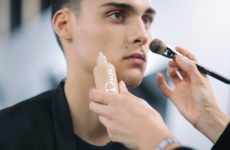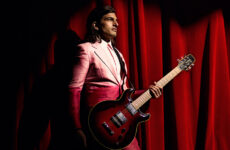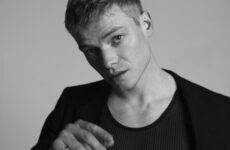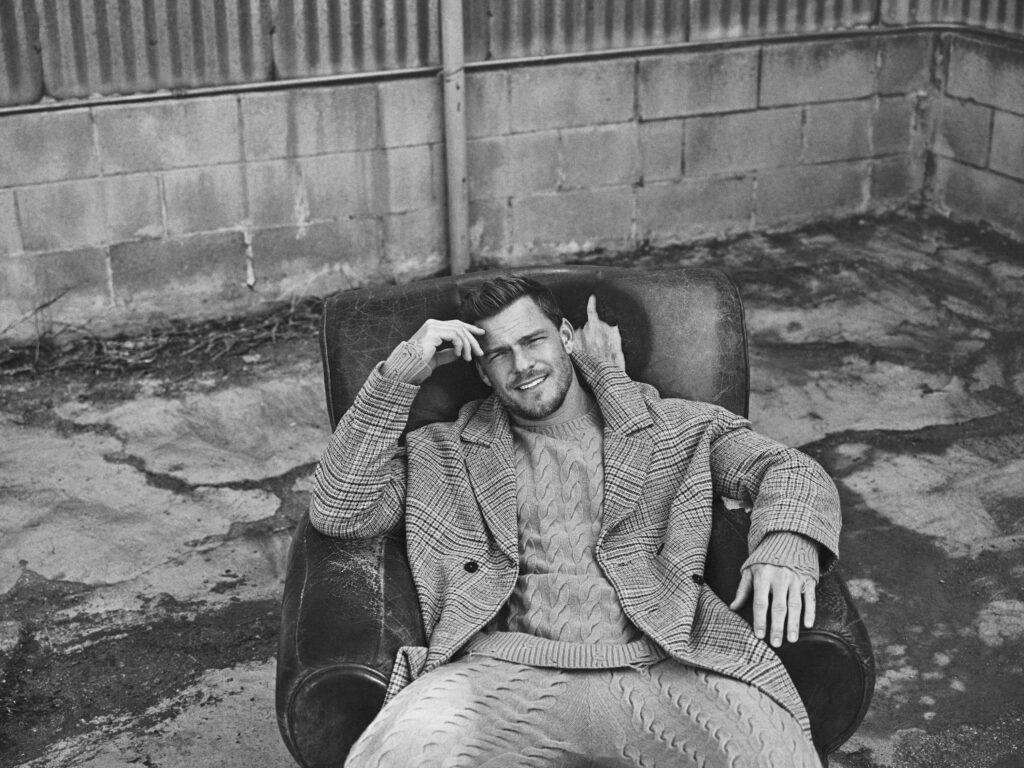
Coat LANEUS, Top LANEUS, Bottom LANEUS
I have been all-in on Alan Ritchson since he was serenading Paula Abdul on American Idol in the early 00’s and joining forces with Tom Welling’s Clark Kent (Superman) on Smallville back in 2005. Since then he has become one of the hardest working actors in Hollywood which includes multiple gigs in the DC universe for shows like Titans, DC’s Legends of Tomorrow and Supergirl. Ritchson has had several breakout roles including the massive The Hunger Games and one of my favorite performances in the cult series Blue Mountain State as Thad Castle. Spanning more than twenty years, Alan Ritchson’s career hasn’t been boring and he has taken on equally gritty roles as he has comedy. If you scrutinize his career path and choices the only logical thing for him to do next was to take on the role of Jack Reacher in the new Amazon series REACHER, out today. I had the chance to talk to Alan over zoom for nearly an hour. We chat about taking on the physical and comedic traits of Reacher, but I couldn’t pass up the opportunity to look back at his journey thus far including a VIP trip to Paris via an invitation from Donatella Versace herself. Here is our conversation.
I saw you guys had a family trip in New York City over the holidays. Any standout moments in the great ‘Metropolis’?
We try to bring them to shows it was something that we never experienced growing up. As an adult, seeing shows and knowing that’s out there and available to people, it’s something I want to give my kids. We try to bring them a little culture. We just found out that there’s a little tiny airport by where we live in Florida that started doing direct flights to JFK. We knew we had to come to visit here. We wanted to give them a Home Alone tour and hit all the spots. They loved it, of course, like Christmas time and Rockefeller Center. We took them to a couple of Broadway shows. We saw The Lion King together as a family, and two of them were wide-eyed, like this is the greatest spectacle in the world. My youngest says I kind of liked the movie better (laughs). It was great. We took pictures in front of the Rockefeller Christmas tree, and we went up to the top of the Empire State Building.
Did you have New York Pizza?
Patsy’s Pizza. There are four or five in Manhattan. It’s my favorite. We were shooting Ninja Turtles there, and we stumbled into that one. Eating pizza on set became a nightly occurrence. That’s my favorite pizza place.
Well, from Metropolis to Smallville. Is there something from filming the series that stays with you from that experience?
Yeah. I’m still waiting for my trophy from Geoff Johns. The smaller ones are tough to answer because there are so many things that when you say Smallville, my mind races to a lot of moments. There’s the macro view I have of that was just how on my heels I was the whole time because it was my first gig.
I’d been out in LA for like three weeks, and I sort of stumbled into an opportunity to go audition and didn’t know what I was doing. I think that was what the producers liked. I came in with no affectation. There was no expectation of what a superhero was, you are just sort of like, here I am, I’m delivering lines, you know. I got lucky because it was more of a symptom of not knowing what I was doing. I came in on season five, and there’s like 200 crew members running around, and I was like, ‘Oh my God, this is such a circus.’ I didn’t realize this is what it was, you know? I was just on my heels, and they hired a coach for me on set. So, there was like the director who was feuding with this coach that they brought on to make sure that things were on par with my acting and character.
CW is sort of treating this as like a pilot for my own show, so they were putting a lot into it. I appreciate what this coach did. I think it’s funny now in hindsight. Knowing what I know now about the business, we’d finish a tape to say cut, and he would walk over to me and say, ‘Come on. Let’s go for a walk.’ He put a cigarette in his mouth, we’d go outside, he’d be smoking. He would say the most random things like ‘The camera wants to steal your soul’. I’m like, ‘okay.’ He goes, ‘You know, penguins at night, they see this. They feel the snow, you know?’ I’m like, ‘What the hell are we talking about right now?’ ‘You gotta feel the snow…’ I’m like, okay, I don’t know what to do with any of this. Then I go in sort of like, not knowing what I was doing, and I’m still just trying to figure out how not to look at my mark every time I’m moving around.
When I think of it, I think of the feud that the director is having to get this fucking coach off my set. Then Tom Welling is going, ‘I think you’re doing great. You know, just keep looking around the room, nobody knows what they’re doing here. Everybody acts like they know what they’re doing, and they don’t.’ He graciously walked me through that experience. There’s a great moment where we were shooting a couple of episodes up at this glacial lake. The water was like 50 degrees. It was freezing and up in the mountains. I was doing all this water work diving off the dock, in a swimming scene with an actress.
I was freezing. Tom shows up halfway through the day, and he must get in the water for a second. He says, ‘Guys, this is freezing. Oh my gosh. I’ve been hypothermic all day. Can we get a hot tub up here or something? They’re like (mimicking a phone or walkie-talkie), ‘Yes, Mr. Welling wants a hot tub’ and in thirty-five minutes there was a hot tub in the middle of the wilderness, up in the mountains of BC, and me and Tom Welling sitting in there chilling out. I thanked him, he said this was great, and I asked how much to put one of these at my house.
I was like ‘This is Hollywood.’ Tom is the most humble, gracious guy. I don’t mean to make him sound arrogant. He was not at all. He did it to help me. It was just so funny how fast you can make something move when you’re the star. Smallville was my university in acting.
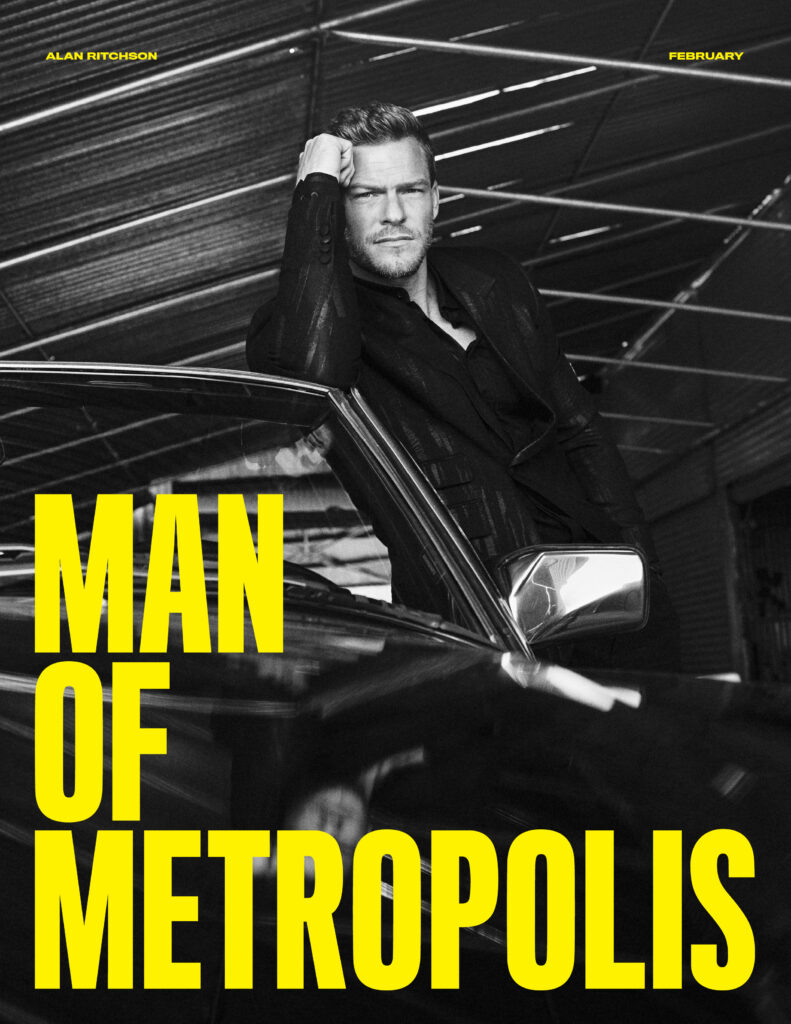
Photographer Dennis Leupold, Stylist Oretta Corbelli, Groomer, Editor Seth Travis; Alan wears Suit DZOJCHEN Shirt DZOJCHEN Boots SCAROSSO
What does DC mean to you as an actor at this point in your career with your involvement in so many projects?
I’d be lying if I said I wasn’t an opportunist. When I started, this opportunity was presented to me, and I got lucky with Smallville. It opened the door to a kid who had a blue-collar past with no family or ties to any artistic endeavors. Here I am in LA on a show, and it just gave me the ability to go speak to people about what else I wanted to do. I felt very, very lucky to be a part of Smallville, and for that to get my foot in the door. I then went on to have a different kind of career, and I’ve found a lot of love for comedy. I did Blue Mountain State playing Thad Castle. I thoroughly enjoyed that kind of physical comedy, and I felt like I found my voice as an actor. I feel like this is what I’m meant to do and what I enjoy the most. I feel like I’ve got a good take on how to do this. I thought that’s sort of the direction my career would take. I got a call from Jeff Johns years later. He asked me to do the show Titans. I felt like I already did the DC thing. Can you do two DC characters?
I felt like we were going to confuse people. He made it clear we’re not trying to remake Smallville. I’m trying to make sure that I’m not going in the circular career pattern. He promised me that this is going to be like a whole new way to tell these stories. It’s dark, it’s gritty. I would be this alcoholic, pill-popping vigilante with a lot of problems. It paralleled my life in an eerie way at that time.
I mentioned this to the producers and writers too. The arcs that Hank was taking on in Titans, battling his demons and addiction, and trying to bring about justice in his way, his relationship with Donnie, everything that he was going through matched my life. It was a mirror image, and it was strange and therapeutic for me. I feel like that character found me and I needed to experience this. Hank and I took an interesting walk together. I feel like I needed that, and I got lucky again, but for different reasons. DC has meant something very personal to me, both as something that kicked off my career and something that taught me a lot as a person taking that journey with somebody who struggles with a lot of the same things.
Have you shared or watched any of these shows with your kids?
The kids were over at my dad’s house. He’s retired, and he fishes a lot. We’ll drop them off there, and he’ll take them fishing. They come back when they laugh, and they make you call it Barbie Baywatch from what is it? I forget what they call them in the show, but there’s a nickname that Tom says to Aquaman in the show, Mr. Baywatch or whatever. My kids are calling me this laughing. I asked where’s that from? My dad showed them an episode of Smallville. It was the first time they’d seen it. They thought it was hilarious, and they were making fun of me. I can’t show them Titans because there was full-frontal nudity.
Thad from Blue Mountain State is just one of those characters on a ballsy show that had a ton of physical comedy. How much of that was your interpretation of the character in the script and your partnering with the director? How did you guys cook him up?
The writers, Eric Falconer and Chris Romano, are a comedy writing duo in LA, and they’re unbelievably talented. They are very funny. They teed that up perfectly. I can’t take all the credit for that. Thad was very much on the page. I thought about what I wanted to do. I sort of captured the inner child of that character. One thing I try to do is make my characters likable, even if they’re sort of villainous. How can we make this character likable? To me, one of the things I detest when I see that sort of arrogant, type of jock archetype is that those guys are truly douchey. They aren’t people I’d want to be friends with. I wanted to push back on that, and I felt like just bringing out his inner child would be fun.
How can I see the world through a nine-year-old’s eyes? You know, a kid who has access to whatever he wants, he’s got more than he should have. It’s like a 12-year-old taking out daddy’s Ferrari, it’s reckless and dangerous, but like the most fun thing in the world for that kid. That’s what it was for me. Admittedly, I was number six on the call sheet out of seven. When I came on board, there was the main storyline and the main argument, main characters, and then there was this sort of like this ancillary character helping to create some contrast. I was desperate to be noticed. I wanted to stay on the show. I didn’t want to get written off the show or killed off or whatever would happen. I didn’t want to die of a cocaine overdose in episode six. I wanted to be a scene-stealer. The first season was hard because the directors hated me. There was one guy, we got in a shouting match because he told me not to do something. I said this was funny to me, so I’m going to do this. I thought I was killing my career; I’m never going to work again, and everybody hates me here. I butted up against quite a few directors. Some people thought some of the stuff I was doing was funny, but, for the most part, there was a lot of friction with directors, and then season two rolls around and it does well.
A lot of people like Thad. Season two came out, and Jay Chandrasekhar, the brilliant writer, had directed some in season one, and he was one of those guys that was very nice. He told me to take it down a notch, and I said okay. Season two rolls around, and he pulls me aside and says, ‘You know, a lot of actors don’t hear these conversations, but I wanted to share with you. So, season one, they’re like, you got to get that under control. Season two, they go, whatever he wants to do, don’t ever tell him not to do something. He’s the guy we’re writing for. He can do whatever he wants.’ I was like, ‘No way.’ He told me I won over a lot of people. It was a whole different conversation this time around. That’s the first time in my career I ever felt like I have the confidence now to just embrace my instincts.
I’m bipolar. I wasn’t diagnosed until just a few years ago, but when you’re bipolar, you have no perspective as to how you’re doing every moment. That’s what’s so difficult about it. If I’m having a moment where I’m getting incredibly frustrated by whatever stimulation there is or the conversation that might seem completely normal to me and in my head, I’m justified for feeling this way, and I’m going to make sure everybody knows. My wife would ask me if I took my medication. She’s my barometer. She helps me look into the mirror, and then she’s always been that way well before we knew I was bipolar. She knows when I need help adjusting to the amount of stimulation. She’s always been the one person on Earth who if she tells me I’m not doing something right I reflect.
Preparing as an actor for a role is a lot different than writing a film and directing a film. So, can you just touch on a little bit of maybe the workflow of what Dark Web: Cicada 3301 was for you? You’re an actor of 20 years, who then goes and writes a feature film, directs a feature film, and acts in the feature film.
That was incredibly difficult. Not just because making a movie is hard, but you’re creating a startup and you’re spending a ton of money on this one single product. That’s like making one iPhone, and that’s the only iPhone that you’ll ever sell. Movie-making is a weird business venture. It’s hard enough on its own, I had a business partner, who wanted a tech-based film. She asked if I had anything like that and I did. I had this weird Dark Web: Cicada 3301 premise based on the real-life secret society scavenger hunt. I said I’ve written this kind of dark comedy about it. We pulled the money together, and we’re making this like two lives being lived. There was me writing, producing, directing, and acting in this thing. Then there was me dealing with this crazy business partner who’s just nuts. I’d wake up one day and she’s like, ‘I don’t like you anymore. I’m taking all the money out of the bank account, and the movie is over’ and I’m like ‘We’re going to production right now. What are you talking about?
Depending on what side of the bed this person woke up on, I was either dealing with litigation or a gift would land in my office like we were best friends today. It was bonkers for me. I wanted to survive and make this product something that people can enjoy and get into their hands. I was lucky to be able to sell it to Grindstone and Lionsgate. I think it was a big success just knowing not only did I complete a film, which is hard enough, but I sold it. I was proud of that.
Do you have Blu Ray or 4k or something in your home?
It was such a personal struggle to survive because of some of the people around me. When I finished, I sort of separated from this business partner in post-production. I was done with this drama. Every day was so volatile and toxic. I put a lot of my own money to finish it. I started resenting the project at the end because I was like pouring money into this thing. I had no help. I was all alone. All the other producers had gotten their paycheck. It was a labor of love by the very end, just almost to prove a point that I could finish this thing, and now I don’t have a copy of it anywhere.
The last copy that I have is almost finished. There are a few frames that we just had to clean up before I could send the finished version to Lionsgate. I’m fine with it. I love directing. If I had to choose between acting or directing, I would 100 percent direct all the time. I just absolutely love being behind the camera.
You have your series on Amazon. You are the star or Reacher based on the Jack Reacher books. How does that feel?
Amazon has unbelievable reach. My favorite show is The Boys. I think it’s one of the coolest shows there is. I was already a huge fan of the kind of work that Amazon was doing. The day that I got the call for Reacher, I was at my cabin up in North Georgia, and they told me I got the part. It was after months of fighting and working hard for this thing I wanted it. I couldn’t talk when I got off the phone. I was trying to tell my wife that we got it, but I walked into the bedroom, and for the first time in my life I was just speechless. She was asked if the kids were okay? Finally, she asked if I got the part. I never got a word out, but she put the pieces together. I was grateful then, and I’m grateful now. I think it doesn’t start to sink in until you see what Amazon’s doing with it, like the push that they’re going to start to see billboards.
Being the star of a show, I would imagine there is a lot more of a collaborative conversation before you guys go into production. How was it working with the Amazon team and director?
I’ve had the good fortune of working on a project as a lead, with some people that were tough to work with. I say that because it taught me the amount of energy that I expend as an actor to try influencing other jobs like producing, writing, postproduction, or whatever. It’s not possible to have a lot of influence over those positions unless you’re really in there with them in the writer’s room or the editing bay. I didn’t understand that at the time. I wanted it to be good, and I had my version of what good was, and I fought hard every day to try and see that come to life. That caused a lot of friction. A lot of people didn’t like working with somebody who kept pushing for some other things, and I saw the result. I was excited about this thing in the beginning. When I saw the result, I thought this was worlds apart from what I thought it was going to be. The amount of energy in enemies that I made along the way didn’t have an effect and wasn’t worth it. That taught me a lot. Sometimes it’s out of my hands, and I just have to trust the filmmakers and producers and everybody who does have a hand in the postproduction pipeline. It’s not my job. I need to save that energy, enjoy the ride, and hope for the best.
I think I became a collaborative partner because of that experience, so I’m grateful for it, as tough as it was. That’s what my goal was on this from the beginning. Even the audition process was one of collaboration where there’d be multiple people during the pandemic. A lot of it was over zoom. There’ll be multiple people online, and somebody would ask if we can try it like this? What if we did it like, stoic and menacing, and somebody would say Reacher just needs to be funny though, let’s do one where it’s like a comedy, and we play. We certainly built Jack Reacher well before we got to set. We started collaborating in those meetings when we were just engaging for the first time. I cherish that process. If I hadn’t had the past experiences, it wouldn’t have prepared me for that. I think I would have taken a lot of that personally, like I’m not doing something right.
I was ready for that. And we took that right up into production. I was getting letters from producers’ days before we started shooting about what they see Jack Reacher doing, how his face moves, how his jaw moves when he says it, how he says it in this scene. The first few days, everybody was tinkering. The director would go, ‘I don’t want to shoot it like this.’ Then a producer would go ‘You’ve got your version. He did it great. Now let’s do our version. Now we want to try it like this.’ We found it together, I cherished that. I think it’s expected that when you’ve got a character that is read by hundreds of millions of people, everybody’s going to have their opinion. It’s expected that the people who are invested the most heavily in the show will want to have their fingerprints on it too. I went into it expecting that.
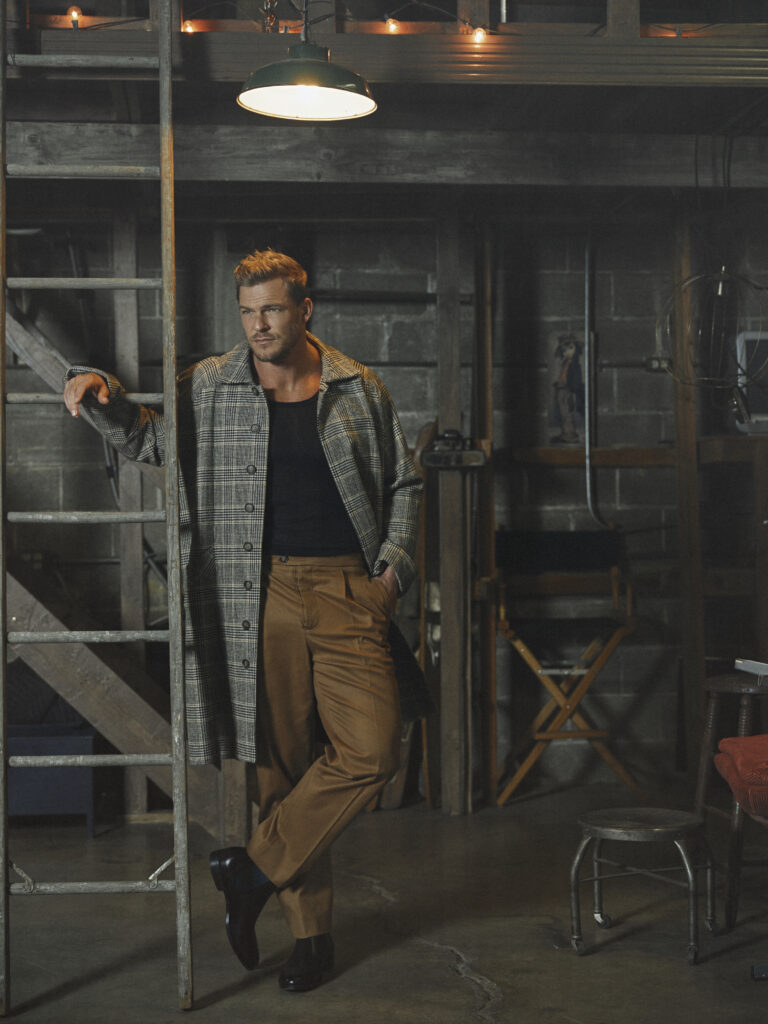
Coat KING & TUCKFIELD Top DZOJCHEN Pants KING & TUCKFILED Boots SCAROSSO
How do you explain Jack Reacher to someone in your life? Like via text once you book it and you’re allowed to tell people, like, how did you explain what the series is going to be?
I’m playing the guy with hands the size of Christmas hams, and I think everybody got it. They told me I was playing an ogre. I grew up in the military. My dad was in the military. I grew up on Eglin Air Force Base, the biggest air force base in the world. To tell people in my world that I’m playing a former military police officer, special investigations unit, people get it right away. Everybody seems to know Reacher, so they know he’s smart, he’s huge and physically imposing. I think one thing we don’t talk a lot about is his humor. I picked up on a lot of humor in the books, and that was the most important thing to bring to this. I want to make sure the show is also funny.
What was it like training for Reacher during a pandemic?
I wasn’t in terrible shape, but just wasn’t in the best shape of my life before COVID-19, and then we got Reacher. I built a gym in my house because everything was shut down, and I was getting a call from Don Granger and Skydance asking if I could put on 30 pounds. I said, ‘First off, everything shut down, this is terrible timing. Secondly, you’re the first person who’s ever told me I need to put on weight. I’ll give it a shot.’ COVID-19 was a boon for me. I had a gym in the dining room.
You’ve been an underwear model, an Abercrombie model. You’ve been a superhero five times over now. You’re Jack Reacher. Like you’ve probably tested and tried so many kinds of diets and fitness routines. What should guys do to look like Jack Reacher?
On the diet side, I’m terrible. I mean, we talked about Patsy’s pizzeria. I used to have it like nightly when I worked on Ninja Turtles. I have a terrible diet. I eat whatever I want. I run so much, and I have a high metabolism. I think I run more than anybody my size. I do it sort of to offset the food I eat. I’ve been staying in shape a long time, and I’ve got a good motivator too, because my career depends on it. I think I have a hard time with consistency. It’s either seasonal for them or they feel like it. Science has shown us that motivation triggers after we start. I don’t feel like running all the time, but I put my shoes on and I go outside in the driveway, and I just accelerate; suddenly, I’m in a flow and I’ll pick off six or eight miles, you know? Motivation starts after you start the activity. Just do something. I think that’ll help because consistency is the key.
How has your style evolved and what has stayed the same?
I think baseball caps will stay the same. I just always want a baseball cap on my head. Growing up in Florida, those like leather thong sandals were all the rage, and so were big baggy jeans. I remember saving up forever for Tommy Hilfiger jeans, and I wanted the big baggy ones. Now I’m in a slim fit if I’m wearing jeans, so that’s evolved. I’ve also learned I don’t care what other people think, I want to be comfortable. I like wearing baggy cotton, soft drop crotch sweats, and longline tees. I’m in stuff that I’m comfortable in.
What is one fashion risk you have taken that’s paid off?
It was the Hunger Games Premier for Catching Fire. I had a cool stylist I was working with. I said I want to wear something that stands out on the red carpet. I feel like guys just wear the black suit or the blue suit. I wonder if there’s something a little more colorful. There was this cool rack of clothes that the stylist brought. It was all gold and silver and flashy sequins. Then there was this green suit that was so sophisticated. After the premiere, there were all these news articles about this amazing Versace suit that I wore. There were seven or eight articles of people just talking about the suit. I got a call from somebody saying Donatella Versace would like to speak with me. She said Miss Versace would like to see you in Paris at her fashion show. She’ll fly you and put you up, she just wants to meet you. I was like, ‘No way.’ Donatella Versace flew me to Paris to enjoy a fashion show and dinner with her, all because I wore the suit that got a ton of press. She treated me so well. It was a real treat.
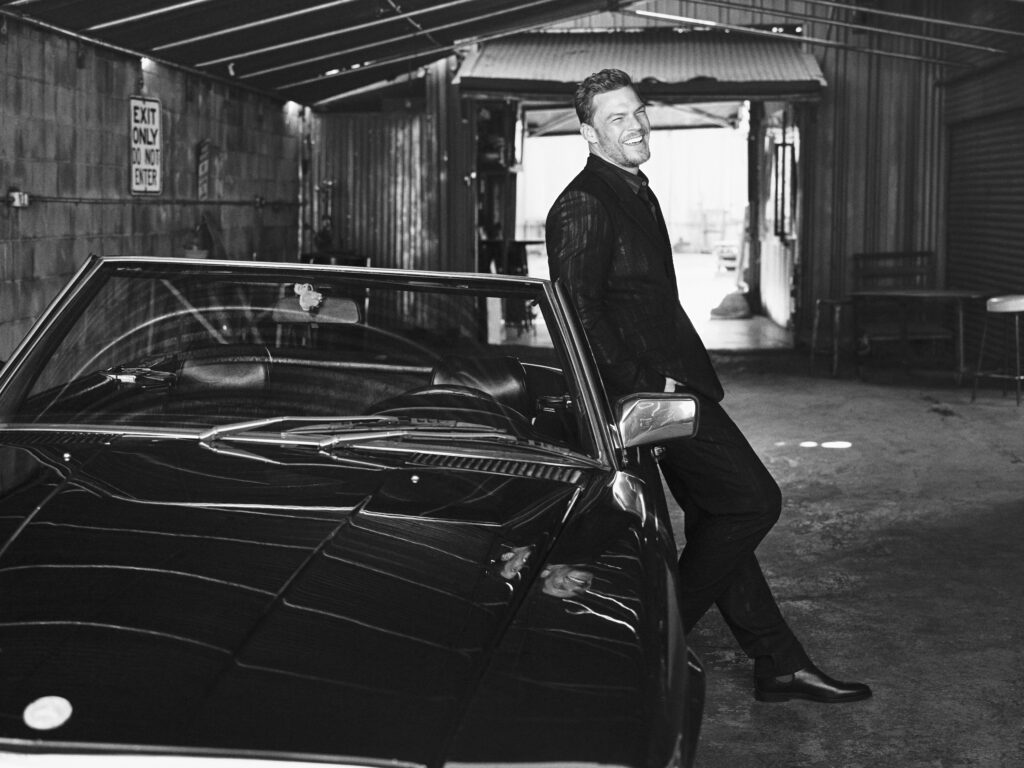
Suit DZOJCHEN, Shirt DZOJCHEN, Boots SCAROSSO
Words to live by?
Oh, wow. Great question! I’ve noticed our capitalistic society doesn’t exactly encourage people to talk about meaning and purpose. We are always being sold something that reinforces this lie that we’re not good enough or we’re told that we’ll be complete if we buy something or subscribe to whatever.
But I believe we have everything we need within us already. Right? I mean, I have to resist the urge to spend to feel empowered or to medicate with material goods as much as anybody. But it’s worth being aware of.
Prior to really taking inventory of what I’d accumulated in life my aims were almost unanimously oriented toward building my little empire. Whatever that might look like for me. But that was exhausting and the fatigue of that lead me to an early midlife crisis. I had to really reevaluate what my purpose was, you know? It caught me off guard too, because I’d had a good year by our society’s standards. Which isn’t something we often consider worthy of a mental breakdown. I certainly didn’t have a language for what I was experiencing.
A lot of times we don’t re-evaluate our lives until we sort of crash and burn and there’s a lot of trauma and we’re at rock bottom and say, “I can’t be here. I’ve got to climb out of this pit.” But there’s the other side of things too, where you get everything you want and the second you get a break from the grind you wonder, “What else is there?”
That was me and I came to terms with the fact that life is about something else. It’s about enjoying wherever you are – whatever your station is in life, yes. But more importantly, it’s about connecting with the divine and connecting with each other. We are communal people, everything about our biology and nature suggests that we are here to connect with one another, to break bread with one another.
I tend to be somebody who likes to retreat and be a bit of a hermit. I have a propensity to live life inside my head. So for me to focus outwardly on other people’s needs… that’s something antithetical to what I’d been doing, but good for me and (I hope) the world.
So pivoting to a life that asks, “what are the needs of the world and how can I better serve?” has given me a whole new/fresh take on life. Long story short, what are my words to live by? Finding purpose and meaning in other people’s wants and needs is a never ending joyride.
Digital Magazine – Download for Free
Photographer: Dennis Leupold, Stylist: Oretta Corbelli, Groomer: Barbara Lamelza, Producer: Kevin Leupold,
Web Edit: Kristopher Fraser, Editor: Seth Travis

